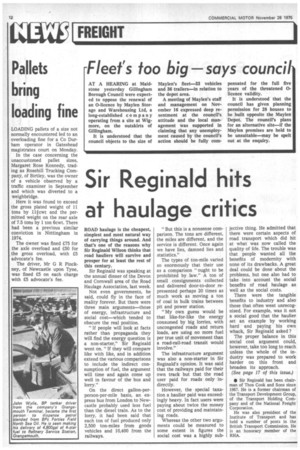Sir Reginald hits at haulage critics
Page 14

If you've noticed an error in this article please click here to report it so we can fix it.
ROAD haulage is the cheapest, simplest and most natural way of carrying things around. And that's one of the reasons why Sir Reginald Wilson thinks that road hauliers will survive and prosper for at least the rest of this century.
Sir Reginald was speaking at the annual dinner of the Devon and Cornwall area of the Road Haulage Association, last week.
Not even governments, he said, could fly in the face of reality forever. But there were three main arguments—those of energy, infrastructure and social cost—which tended to obscure the real position.
"If people will look at facts rather than propaganda they will find the energy question is a non-starter," Sir Reginald went on. " If they will compare like with like, and in addition extend the various comparisons to include the indirect consumption of fuel, the argument will time and again come up well in favour of the bus and lorry."
On the direct gallon-perperson-per-mile basis, an express bus from London to Newcastle probably used less fuel than the diesel train. As to the lorry, it had been said that each ton of fuel produced only 2,500 ton-miles from goods vehicles and 10,400 from the railways. " But this is a nonsense comparison. The tons are different, the miles are different, and the service is different. Once again we have lies, damned lies and statistics."
The types of ton-mile varied so enormously that their use as a comparison "ought to be prohibited by law." A ton of small consignments collected and delivered door-to-door represented perhaps 20 times as much work as moving a ton of coal in bulk trains between pit and power station.
'My own guess would be that like-for-like the energy consumed by big lorries, with uncongested roads and return loads, are using no more fuel per true unit of movement than a road-rail-road transit would involve."
The infrastructure argument was also a non-starter in Sir Reginald's opinion. It was said that the railways paid for their own track but that the road user paid for roads only indirectly.
However, the special taxation a haulier paid was exceedingly heavy. In fact users were paying about twice the money cost of providing and maintaining roads.
Whereas the other two arguments could be measured to some extent in figures the social cost was a highly sub jective thing. He admitted that there were certain aspects of road transport which did hit at what was now called the quality of life. The trouble was that people wanted all the benefits of modernity with none of its drawbacks. A great deal could be done about the problems, but one also had to take into account the social benefits of road haulage as well as the social costs.
There were the tangible benefits to industry and also those that often went unrecognised. For example, was it not a social good that the haulier set an example by working hard and paying his own whack, Sir Reginald asked ?
The proper balance in this social cost argument could, however, take too long to reach unless the whole of the industry was prepared to work harder on this front and broaden its approach.
(See page 17 of this issue.)
• Sir Reginald has been chairman of Thos Cook and Sons since 1967. He is a former chairman of the Transport Development Group, of the Transport Holding Cornpany and of the National Freight Corporation.
He was also president of the Institute of Transport and has held a number of posts in the British Transport Commission. He is an honorary member of the RHA.




































































